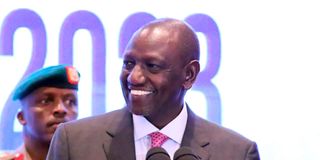Premium
No immediate plan to increase varsity fees, President William Ruto says

President William Ruto has clarified that the governmnet gas no immediate plan to increase fees in universities.
President William Ruto has sought to put the raging debate on the cost of higher education in the country to an end stating that the government has no immediate plan to increase fees in public universities.
Dr Ruto also stated that the government does not plan to privatise public universities as had been claimed by some stakeholders in the education sector in the past few days.
"We are aware of the challenges the university sub-sector is undergoing on finance and capitation, and as such, we will await the final recommendations from the Presidential Working Party on Education Reforms on this matter" Dr Ruto said.
Dr Ruto said the government did not plan to privatise public universities, but instead was committed to support public universities and provide funding through capitation and funding to students through the Higher Education Loans Board (Helb) which is undergoing reforms.
"There is no time that the government has ever contemplated privatising public universities as we are aware of the important role education plays in socio-economic and political development of a country," Dr Ruto said.
Instead, the recommendations from the Presidential Party on Education Reforms which has not been unveiled will guide the process on the matter of fees and capitation for the students.
The team chaired by Professor Raphael Munavu is expected to present the final recommendations on reforms in the country's education system and curriculum to the President at the end of this month.
Universities were expected to increase fees from Sh16,000 to Sh48,000 in the ongoing education reforms according to recommendations from Vice Chancellors from 35 public universities, with the issue eliciting a lot of backlash from various stakeholders with students threatening demonstrations countrywide.
The public universities are faced with a funding crisis, having accumulated a debt of Sh60.6 billion with majority unable to pay academic and non academic staff, have not released statutory deductions to various institutions and have lately declared employees redundant to cut costs.
There have been calls to privatise the public universities so as to get them out of the existing financial quagmire, by injecting funds from private sector players as part of the proposed reforms in the education sector.
Dr Ruto’s recommendations were contained in a speech read on his behalf by the Cabinet Secretary for Education Ezekiel Machogu during the 10 years anniversary since University of Kabianga in Kericho county was awarded a charter by the government.
"I am glad the University of Kabianga manufactures low cost high quality detergents and produces water, juice, livestock and poultry feeds in what contributed to economic development" Dr Ruto said.
Global trends
He said there was a need to re-engineer universities to adapt to global trends, adapt posture of the 21st century and ensure they are relevant to the needs of the people in a world that is fast adopting Information Communication Technology (ICT in transacting business.
Mr Machogu on his part said the views that were attributed to Vice Chancellor's were not a government position on the matter but mere suggestion.
"The claims that fees in universities will be raised and talk of privatising the public institutions is the work of busybodies as there is nothing like that.When the Vice achancelloes had a meeting last week In Mombasa aland which I opened last Tuesday, we did not say the fees will be increased," Mr Machogu said.
Mr Machogu said Sh15,042 for the student capitation programme and Sh17.8 million textbooks had been released to schools in the country by the ministry of education.
The government has engaged the World Bank to construct 40 percent of laboratories required in schools under the Junior Secondary Schools (JSS) while 60 percent would be put up by Members of Parliament under the Constituency Development Fund.
Market driven
Prof Wilson Kipngeno, the university's Vice Chancellor said in the last 10 years, the university had developed market driven education programs raising them from 39 to 90 in 2022.
"University of Kabianga now has nine PhD programs with the first cohort having graduated in 2019" Professor Kipngeno said adding that from the initial 342 non-teaching staff, and 95 teaching staff, the number has increased to 560 out which 204 are academic members," Professor Kipngeno stated.
The student population at the university has increased from 3,000 to the current 8,500 and the numbers are expected to increase yearly with expansion of facilities and education programs.
He revealed that the financial constraints the university has experienced like all the others in the country has caused delays in completion of projects and implementation of Collective Bargaining Agreement (CBA) signed with trade unions.
[email protected]





